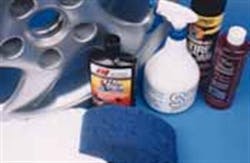What you don´t know about cleaning and caring for your customer´s custom wheels can ruin them.
To help your customers get the most out of their wheel investment, follow these guidelines:
1. Always allow the wheels to cool. Never wash, scrub or polish a hot wheel.
2. Rinse both sides of the wheel with warm, clean water. Gently apply a mixture of clean water and a mild soap, such as dishwashing liquid or an aluminum-safe car wash concentrate liquid, using a soft mitt or soft towel.
3. Rinse the wheel thoroughly with clean, warm water.
4. Dry the wheels with compressed air or with soft, clean towels.
5. Do not wash, clean or allow the wheels to dry in hot sunlight.
If light road tar, grease or similar surface contaminants are found, try washing the surface with a mild "paint safe" solvent such as bug and tar remover or surface-prep solvents that are routinely used by body shops to safely clean painted surfaces. These mild solvents will remove petroleum and similar surface contaminants.
But never apply these solvents to a hot wheel. Always allow the wheel to cool before using any cleaners.
Several manufacturers offer spray-on/rinse-off cleaners. This type of cleaner is sprayed onto a dry, cool wheel, allowed to soak for a short period of time, then rinsed off.
Some of these cleaners work extremely well, but only if used regularly. If the wheel is coated with stubborn brake dust or other contaminants, a more aggressive cleaner will be required.
[PAGEBREAK]
Tell your customers to be very careful when considering any commercial wheel cleaner. Many wheel makers who produce clearcoated wheels may specifically state that the use of an aggressive wheel cleaner will void the wheel´s finish warranty. Unless a wheel cleaner is specifically designed to clean clearcoated wheels, it´s best for them to not take a chance.
Scratchy rags or towels -- even reinforced synthetic towels -- can result in slight surface marring. When washing an alloy wheel, they should never use a stiff, scratchy bristle brush, S.O.S. pad or anything else that´s abrasive. Only soft, clean sponges or rags should be used by anyone cleaning an alloy wheel.
If a clearcoated wheel´s finish is nicked or cut, the clearcoat is now compromised. If left unattended, this break of the surface coating can result in increased damage as moisture begins to migrate under the clearcoat surface.
If they do notice a small chip in a clearcoat, they should dab a small amount of clear enamel onto the nick to seal it. If they´re careful, the repair spot won´t be noticeable, and they´ll likely prevent future degradation.
Chemical warfare
An automatic car wash simply cannot do a good job of cleaning expensive custom wheels. Also, be sure to tell your customers that if either an "automatic" or "do-it-yourself" car wash offers a "wheel bright" option, they shouldn´t use it, especially on a non-coated aluminum wheel.
Many of these "brightening" chemicals are caustic and will discolor or even etch the aluminum surface. If customers insist on using an automatic car wash, they should at least wipe off the wheels with a clean, soft (preferably 100% cotton) towel immediately afterwards. This will help to remove surface grime.




